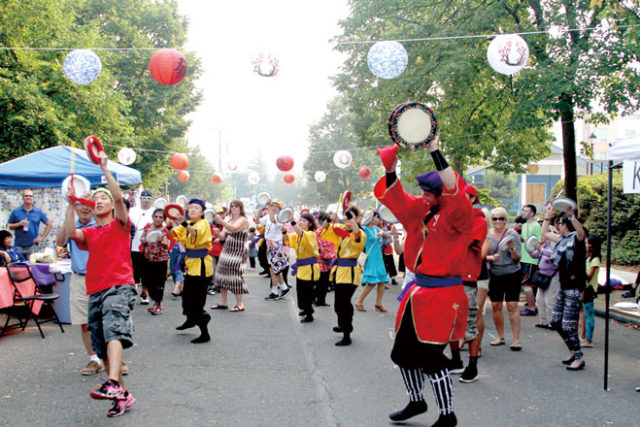
By Shihou Sasaki
The North American Post
For another year the street will be colorful as a testament of how the Kawabe Memorial House has been a community-oriented place. From foods to family activities and cultural performances, the annual Summerfest! event will be a family-style gathering.
The Kawabe House representatives said that the event has been growing and scheduling the stage performances was not easy this year. During the five-hour event on Aug. 28, various activity booths will be set to sell authentic foods from local organizations and apartment residents and share activities. Additionally, a stage will be designated to entertain through cultural performances including taiko, dances, kendo, karaoke and this year’s special feature Reptile Man.
Local organizations including Koyasan Buddhist Temple, First Hill Lions Club, Seattle Buddhist Church and others will set up booths to support the festival.
The street fair began in 2012, according to Bea Kiyohara, to raise funds to furnish the wellness center, which has been under the basement-upgrading project. The first year was not as crowded as it is now, but the event was successful enough to cover the cost of exercise equipment.
“It’s all of extra things that we have to raise money from outside because our rent does not pay for,” said Kiyohara, festival committee chair.
But still, the additions have been helpful for the residents’ quality of life.
This year, the event goal is to raise enough funding to acquire a 14-passenger van for residents who face transportation barriers. Connie Devaney, executive director of Kawabe Memorial House, said that the van will widen possibilities for senior activities including shopping in the International District, hospital visits for doctor appointments or even to plan possible field trips for seasonal activities and recreation such as viewing cherry blossoms in Spring.
Last year, the event raised about $9,800. According to the Kawabe Memorial House, purchasing a van will be achievable, as they have already received some grants and donations.
Kiyohara added that there are some Nisei (second generation) seniors who face some isolation from the community due to a lack of transportation.
“Building a community here is really nice,” she said. “They would like to go together and do something together, going on a field trip. Even just a transportation, they will really appreciate it.”
Founder and businessman Harry Kawabe built the Kawabe Memorial House in 1972 to achieve a dream to support seniors who struggled due to language and cultural barriers. About 14 percent of residents are over the age of 80 and are mostly immigrants.
In 2012, the organization paid off its 40-year HUD mortgage. In the same year, the summer festival program was launched, and over 400 visitors enjoyed the family-style festivity last year.
The senior apartment will celebrate its 45th anniversary next year. The board members and staff are planning to host the dedication event in March after building renovations for the basement space and kitchens in each room.
The demographics and lifestyle have been changing in the neighborhood, but Devaney said that the Kawabe Memorial House continues to serve their target seniors. She added that the number of the Japanese residents has been growing by about 30 percent of the total in recent years.
“Japanese churches are located here,” she said. “I hope that would continue draw older Japanese and Japanese Americans back to us.”
In an afternoon meeting with Kiyohara and Devaney, Japanese songs were played and sung at the community room, which was rented by a local song club sharing time with residents.
“Kawabe is a critical part of this meeting community,” Kiyohara said. “We are just an institution, but people do walk by and do know what Kawabe is about.”
Residents’ Participation Enliven Fair
The participation by the apartment residents has also been coloring the festival. The residents volunteer to cook themselves and serve their authentic foods at the food booth during the day.
Yoshio Yari, a former owner and chef of the Japanese Restaurant Togetsu, has been one of them. He used to prepare a few dozen Japanese bento, which has been known by the community members for the quality.
“The staff in the Kawabe has been doing great for us, and I want to give some back to them,” Yari said. “It is always good to have something to live for.”
Unfortunately, the bento is usually sold out in the beginning or prior to the festival every year. As he wants to share the taste with wider audiences, now age 82, he has changed his dish this year to serve “Hiyashi Chuka (cold noodle)” with his special sauce.
“This will be a great taste,” he said. “I hope this will present a good memory for anyone to eat.”
Devaney said that the resident participation and involvement with the activities at their comfort level is a great example of the identity of the Kawabe Memorial House. According to her, the residents voted on the colors of the building exterior and kitchen cabinets during the renovation project.
Board members will appear at the Sunday event and stand at the food booths like long-time board member Tomio Moriguchi, who will be a frontal individual for the Hot Dog/ Corn stand.
“He really likes the Streetfair! He always comes early, helps set up tables,” Devaney said, smiling. “It’s a great fun, working with that many people putting together for the event with all the different cultures coming toward the same goal.”
More information about the Kawabe Memorial House street fair can be found on the calendar page or at (206) 322-4550.

Photo by Shihou Sasaki The North American Post



